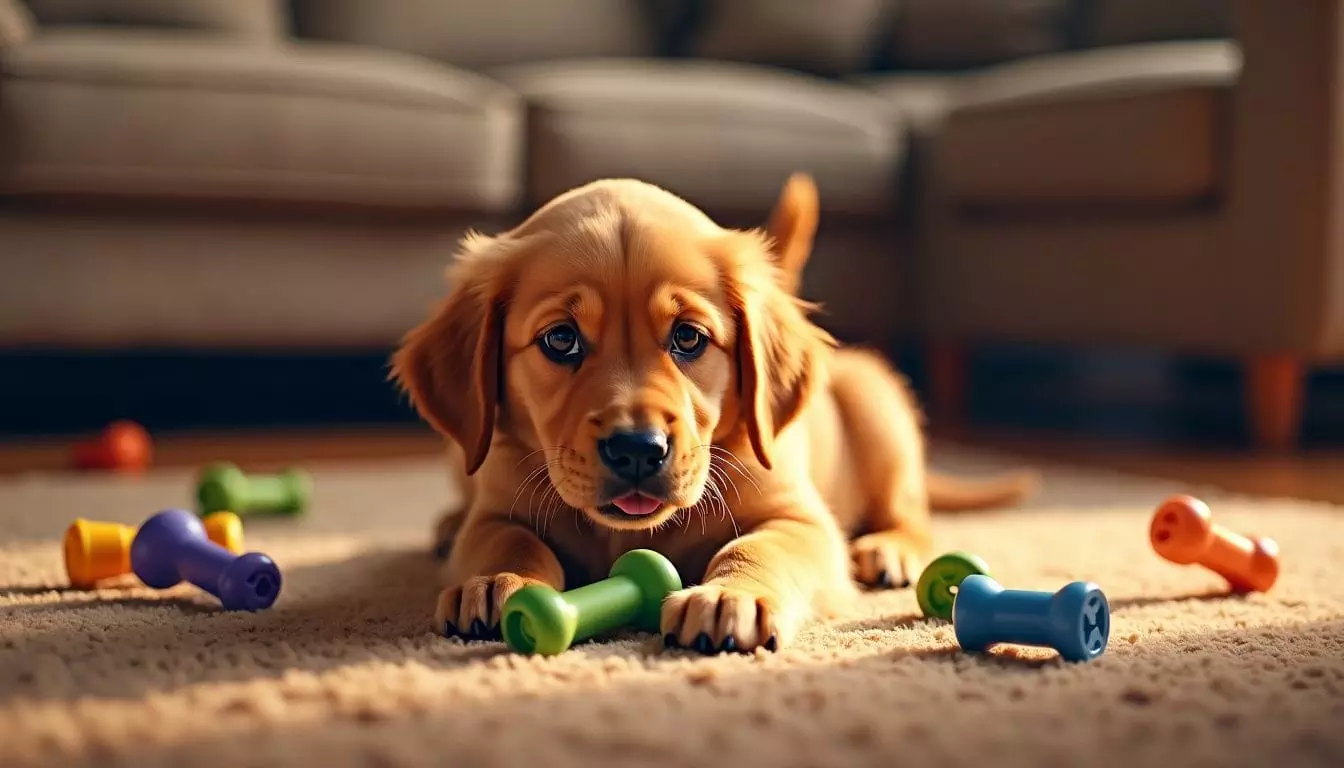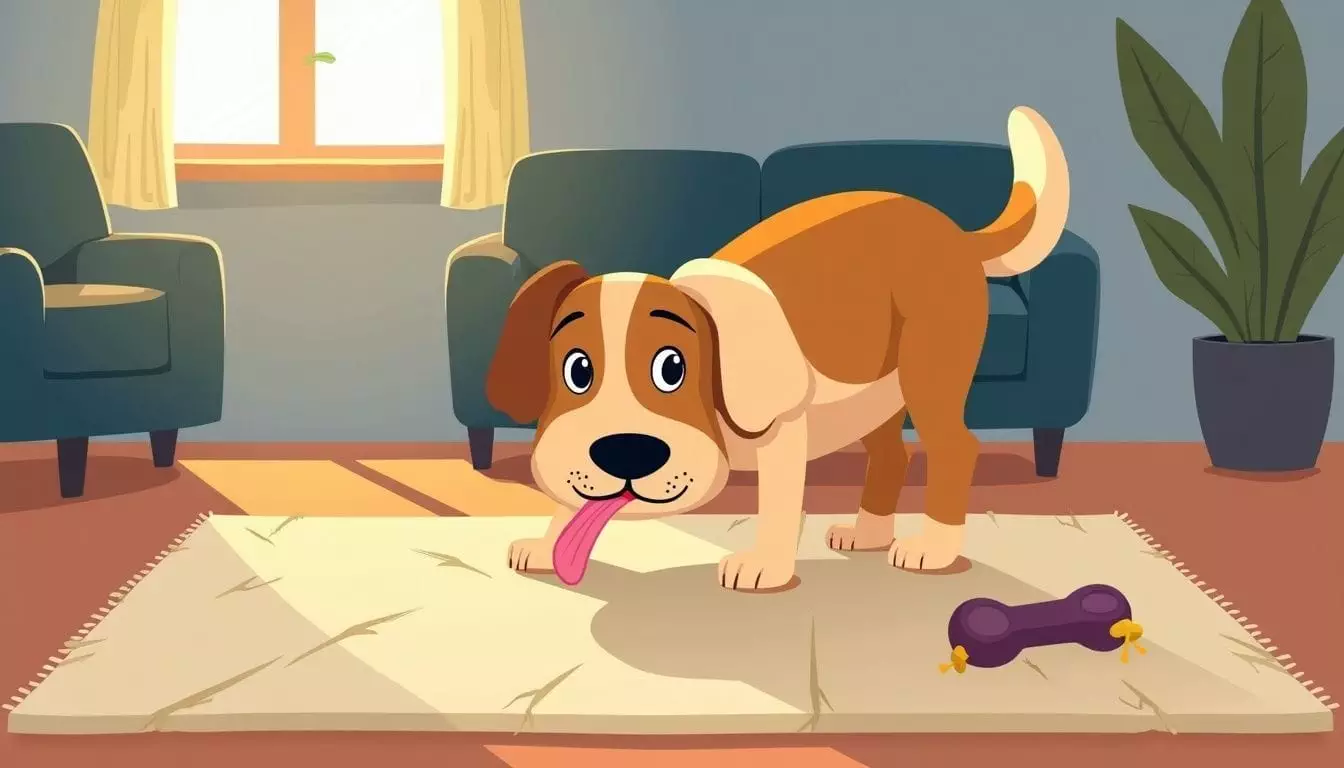Dogs licking carpets suddenly can alarm pet owners. This behavior often signals underlying health issues or emotional distress. A study by the American Veterinary Medical Association found that 20% of dogs exhibit compulsive licking behaviors.
Why is my dog licking the carpet all of a sudden? Expert answers reveal multiple causes, from nausea to anxiety. 1
Our team of veterinarians and certified dog trainers brings decades of experience to this topic. They’ve seen countless cases of carpet-licking dogs and know the best solutions. This article covers the top reasons for this behavior and offers practical advice.
Learn how to help your furry friend and when to seek professional care. 2 3
Key Takeaways
- Dogs may lick carpets due to health issues like nausea, dental problems, or anxiety.
- 20% of dogs show compulsive licking behaviors, often linked to stress or boredom.
- 74% of dogs who lick surfaces too much have stomach issues, including giardiasis.
- Vets can help diagnose and treat underlying causes of carpet licking.
- Simple solutions include providing toys, exercise, and training to reduce this behavior.
Common Causes of Sudden Carpet Licking in Dogs

Dogs may lick carpets due to various reasons. These can range from health issues to behavioral problems. Let’s explore some common causes of this odd behavior.
Nausea and Digestive Issues
Dogs often lick carpets due to nausea or digestive problems. This behavior can signal an upset stomach, liver disease, or parasites. 1 Vets may suggest Pepcid AC or similar meds to ease discomfort.
A bland diet of boiled chicken and rice can help settle the stomach.
Excessive surface licking in dogs may indicate a gastrointestinal disorder, notes Dr. Sarah, a veterinary expert.
Research links carpet licking to gut issues. 2 Owners should watch for other signs like vomiting or diarrhea. Quick action, such as giving Pepcid and bland food, can provide relief.
If symptoms persist, a vet visit is crucial to rule out serious conditions.
Mouth or Dental Problems
Dental issues often spark sudden carpet licking in dogs. Tooth pain, gum disease, or objects stuck in the mouth can cause discomfort. Dogs may lick carpets to soothe oral pain or dislodge foreign items.
A tooth root abscess or cracked tooth might lead to this behavior. 1 Esophagitis, an inflamed food pipe, can also trigger carpet licking. Dr. Lazarcheff notes this condition needs a vet’s care.
Oral problems require prompt attention to prevent worse health issues. 3 Next, we’ll explore how anxiety and stress impact a dog’s licking habits.
Anxiety and Stress
Dental issues can cause discomfort, but stress also plays a role in odd behaviors. Dogs often lick carpets to cope with anxiety. This action releases calming chemicals in their brains.
Loud noises, changes at home, or being left alone can trigger this behavior. Some dogs develop obsessive-compulsive disorder (OCD) from constant stress. Exercise and play help reduce anxiety in most cases.
Vets may suggest special products to ease a dog’s nerves. 4 5
Compulsive Disorders
Dogs sometimes develop compulsive disorders, leading to excessive carpet licking. 4 These behaviors often stem from stress, anxiety, or boredom. Vets may diagnose conditions like obsessive-compulsive disorder (OCD) in dogs.
Signs include repetitive actions that seem pointless or harmful. Licking releases endorphins, which can make dogs feel better temporarily.
Treating compulsive licking involves addressing the root cause. Owners can try stress-reducing products or deterrent sprays on carpets. 3 Training techniques and verbal corrections help too.
Providing mental stimulation through toys like Kongs can reduce boredom-related licking. If the behavior persists, a vet visit is crucial to rule out underlying health issues.
Health Concerns Linked to Excessive Licking
Dogs who lick too much may have serious health issues. Read on to learn about these problems and how to help your pet.
Giardiasis
Giardiasis is a common gut problem in dogs. A Canadian study found that 74% of dogs who lick surfaces too much have stomach issues, including giardiasis. 6 This illness comes from tiny bugs called Giardia.
They live in the dog’s intestines and cause trouble. Signs of giardiasis include lots of licking, upset stomach, and loose stools. Vets can test for it and give medicine to help. They might also suggest special food.
With the right care, most dogs get better in about 3 months. The study showed that 59% of treated dogs licked less after 90 days. 7PancreatitisPancreatitis in dogs is a serious condition. It happens when the pancreas gets inflamed. Dogs with this illness often feel very sick. They may not want to eat and might throw up. The pancreas helps digest food, so when it’s not working right, it causes big problems.
Some dogs are more likely to get pancreatitis. Miniature Schnauzers have a higher risk due to their genes. 8 Eating fatty foods can trigger it too. Table scraps are a big no-no. 8 Certain drugs can also cause this issue.
If you think your dog has pancreatitis, take them to the vet right away. Quick treatment is key to help your furry friend feel better. 1
Delayed Gastric Emptying
Delayed gastric emptying often follows pancreatitis in dogs. This condition slows food movement from the stomach to the intestines. Dogs with this issue may lick carpets or floors more.
Vets might need to step in to help. 9
Dr. Gabby suggests solid foods for dogs with this problem. These foods can push obstructions down the throat. This advice aims to ease discomfort and stop odd licking habits. Quick action can prevent worse health issues. 10
Canine Cognitive Dysfunction
Canine cognitive dysfunction affects older dogs. It’s like doggy Alzheimer’s. Dogs with this problem may forget things and act confused. They might lick carpets or floors more often. 3 This happens because their brains are changing as they age.
Vets can help manage this condition. They might suggest special diets or medicines. Training can also help dogs with cognitive issues. Owners should watch for signs like excessive licking or odd behaviors. 4 Early care can make a big difference in a dog’s quality of life. Next, let’s look at some practical solutions for carpet licking.
Behavioral and Environmental Factors
Dogs may act out when bored or seeking attention. Changes at home can also spark new behaviors in pets.
Boredom
Bored dogs often turn to carpet licking as a way to pass time. This behavior stems from a lack of mental and physical stimulation. Experts suggest providing new toys and creating a low-stress environment to combat boredom-induced licking. 4 Regular exercise and interactive play sessions can help burn excess energy and keep a dog’s mind engaged. Pet owners should aim to give their furry friends at least 30 minutes of active playtime daily. 4 Anxiety and stress can also trigger excessive licking behaviors in dogs. 11
Attention-Seeking Behavior
Dogs often lick carpets to get their owners’ attention. This behavior stems from boredom or a lack of mental stimulation. Pups learn that licking floors makes humans react – even if it’s just to say “stop.” They see this as a fun game or a way to interact. 3
Experts suggest using Kong toys as distractions for attention-seeking dogs. Consistent supervision and leash training help redirect inappropriate licking. Rewarding good behavior teaches pups better ways to get noticed.
Dog pheromones can have calming effects on anxious pets who act out for attention. The “Nothing in Life is Free” method trains dogs to earn rewards through good actions. 12
Changes in the Household or Routine
Changes in a dog’s home or daily life can spark carpet licking. Moving to a new house, redecorating, or bringing in fresh furniture may confuse pets. A dog’s nose picks up new scents, leading to odd behaviors. 2 Family changes like a new baby or pet can also cause stress. Even small shifts in schedules or a family member’s absence might upset a dog’s balance.
Experts suggest ways to help dogs adjust. Dr. Andy recommends using deterrents and stress-reducing products for young dogs eating carpet. Pawsitivtrainr advises giving new toys and creating a calm space.
These tips aim to ease a pet’s anxiety during big changes. 4 Next, we’ll look at how boredom affects dog behavior.
Related Behavioral Issues: Why Is My Dog Scratching the Floor All of a Sudden?
Dogs scratch floors for many reasons. Acid reflux or nausea often cause this behavior. 3 Vets see this a lot in dogs with upset stomachs. Other signs to watch for include vomiting, drooling, or loss of appetite.
These symptoms point to digestive issues that need care.
Pet owners can try simple fixes at home. Taking away food for 12-24 hours helps settle stomachs. Then, offer small meals of plain chicken and rice. Smells in carpets may also trigger scratching.
Cleaning floors removes tempting scents. For ongoing issues, vets may suggest special diets or meds. Training and toys like Kongs can distract dogs from problem behaviors. 1
Practical Solutions and Prevention
Dogs need help to stop licking carpets. Owners can try simple fixes at home or ask a vet for advice.
Monitoring and Recording Behavior
Tracking a dog’s licking behavior helps identify potential health issues. Pet owners can use these steps to monitor and record their dog’s carpet licking:
- Keep a daily log: Note when, where, and how long the dog licks the carpet.
- Record triggers: Write down any events or changes that seem to start the licking.
- Watch for other symptoms: Look for signs like vomiting, diarrhea, or loss of appetite. 1
- Use a smartphone: Take videos of the licking to show the vet.
- Check the carpet: Look for any stains, spills, or odd smells that might attract the dog.
- Time the episodes: Use a stopwatch to measure how long each licking bout lasts.
- Note changes in routine: Write down any new foods, meds, or schedule shifts.
- Track water intake: Measure how much the dog drinks each day.
- Observe body language: Watch for signs of stress or discomfort during licking.
- Count licking frequency: Tally how many times per day the dog licks the carpet.
These records will help vets pinpoint the cause of the licking. 3 Next, we’ll explore environmental factors that may lead to this behavior.
Environmental Enrichment Strategies
Environmental enrichment keeps dogs happy and busy. Here are strategies to enrich your dog’s life:
- Puzzle toys: Give your dog food-dispensing toys. These make meals fun and challenging. 12
- New scents: Introduce different smells around the house. Use pet-safe essential oils or herbs. 2
- Training sessions: Teach your dog new tricks. Short, daily sessions boost mental stimulation.
- Rotating toys: Switch out toys weekly. This keeps playtime fresh and exciting.
- Safe space: Create a cozy corner for your dog. Use a special bed and favorite toys.
- Digging box: Set up a sandbox for digging. Hide toys for your dog to find.
- Obstacle course: Build a simple agility course in your yard. Use household items as obstacles.
- Window perch: Give your dog a view outside. Place a bed near a window for watching.
- Music or TV: Play calming sounds or dog-friendly shows. This adds auditory enrichment.
- Snuffle mat: Make or buy a mat for hiding treats. It taps into natural foraging instincts.
Consulting a Veterinarian
Environmental enrichment strategies lead to better health. But sometimes, dogs need expert care. Vets play a key role in solving carpet licking issues. 2
Vets can spot health problems causing odd behaviors. They check for nausea, dental issues, and anxiety. Dr. Ryan suggests Pepcid AC for acid reflux every 12 hours. Vets may prescribe meds or special diets to help.
For older dogs with obsessive licking, vets might advise bitter sprays. Serious cases might need antibiotics or other treatments. A vet visit is crucial for proper diagnosis and care. 3Behavioral Training
After consulting a vet, dog owners can turn to behavioral training. This approach tackles the root cause of carpet licking. Experts suggest using positive reinforcement techniques.
These methods reward good behavior and ignore unwanted actions.
Consistency is key in training. Owners must set clear rules and stick to them. Offering safe chew toys can redirect a dog’s urge to lick or chew. 3 For example, a Kong toy filled with treats keeps dogs busy.
Some trainers recommend a “Nothing in Life is Free” method. This teaches dogs to earn rewards through good behavior. 12
Conclusion
Dog carpet licking often signals health or behavior issues. Quick action helps solve the problem. Owners should watch for other symptoms and see a vet if needed. Simple changes in diet, exercise, or routine can often help.
With care and attention, most dogs can overcome this habit and return to normal.
If you’re also wondering about your dog’s sudden floor scratching behavior, learn more by reading our detailed guide here. You might be surprised to learn that there are various reasons behind this behavior, ranging from discomfort to instinctual habits. In our guide, we delve into the common causes and offer tips on how to address them effectively. For a comprehensive understanding, make sure to check out the section where ‘dog scratching behavior explained‘ provides valuable insights into what your furry friend might be trying to communicate.
FAQs
1. Why is my dog suddenly licking the carpet?
Your dog may be licking the carpet due to anxiety, boredom, or health issues. It could be a coping mechanism for stress or a sign of gastrointestinal problems. If it’s new behavior, watch for other symptoms and consider a vet visit. Understanding why dogs lick carpets can help you address the behavior appropriately. Sometimes, it might simply be an attempt to explore their environment or to investigate a scent trapped in the fibers. However, if the behavior becomes obsessive or is accompanied by other unusual signs, consulting a veterinarian is crucial to rule out underlying issues.
2. How can I stop my dog from licking the floor?
To stop carpet licking, try these:
– Provide more exercise and mental stimulation
– Use positive reinforcement training
– Offer chew toys as a distraction
– Clean the area thoroughly
– Consider anxiety-reducing techniques
If licking continues, consult a vet to rule out medical causes.
3. Is it normal for dogs to lick everything in the house?
Some licking is normal, but excessive licking of surfaces can indicate:
– Nutritional deficiencies
– Digestive issues
– Anxiety or compulsive behavior
– Boredom or attention-seeking
Monitor the frequency and intensity of licking. If it’s constant, seek professional advice.
4. Could carpet licking be a sign of illness in my dog?
Yes, sudden carpet licking might signal:
– Nausea or upset stomach
– Acid reflux
– Intestinal parasites
– Neurological issues
Look for other symptoms like changes in appetite, vomiting, or diarrhea. A vet check-up can help determine the cause.
5. What should I do if my old dog starts licking the floor excessively?
For older dogs, new licking behaviors might indicate:
– Cognitive decline
– Joint pain
– Dental problems
Provide a comfortable bed, maintain a routine, and consult your vet. They might recommend tests or treatments to address underlying issues.
6. Can diet changes help stop my dog from licking the carpet?
Diet adjustments might help if licking is due to digestive issues:
– Try a bland diet (like boiled chicken and rice) temporarily
– Add fiber to their food
– Ensure they’re getting proper nutrients
Always consult your vet before making major diet changes. They can guide you on the best nutrition for your dog’s needs.
References
- ^ https://www.justanswer.com/dog-health/65o07-year-old-dog-licking-carpet-sounds.html (2012-01-26)
- ^ https://bestfriendsvet.org/blog/dog-licks-carpet/
- ^ https://www.justanswer.com/dog-health/g6tzv-dog-woke-profusely-licking-carpet.html
- ^ https://www.akc.org/expert-advice/advice/why-dogs-lick-furniture/
- ^ https://www.aspcapetinsurance.com/resources/14-reasons-dogs-lick-everything/
- ^ https://www.barkandwhiskers.com/2023-08-06-nl-excessive-licking-surfaces-dogs/
- ^ https://www.animalhealthfoundation.org/blog/2013/07/dogs-excessive-licking-may-indicate-gi-trouble/ (2013-07-15)
- ^ https://www.researchgate.net/publication/238511240_Gastrointestinal_disorders_in_dogs_with_excessive_licking_of_surfaces
- ^ https://pethelpful.com/dogs/Why-is-My-Dog-Licking-the-Carpet (2020-11-22)
- ^ https://www.dogster.com/dog-behavior/why-does-my-dog-lick-the-carpet

